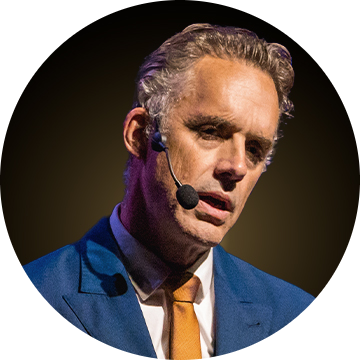
Jordan Peterson, born in June 1962, is a Canadian clinical psychologist and professor of psychology as well as a bestselling author with a multifaced career and a wide range of influence who gained widespread attention in the late 2010s.
His perspectives are often grounded in his background as a clinical psychologist as well as his interpretations of various psychological, philosophical, and religious concepts - being known for his critiques of political correctness and his commentary on cultural and psychological issues, his views are polarizing, leading to a diverse range of public perceptions.
Peterson’s activities extend beyond philosophical, and religious notions as well as traditional academic and clinical psychology into public discourse, media, and digital education, and while the public views him as a ‘free speech advocate’, there are mixed feelings about his work.
Before indulging public perspective, let’s have a look at what Jordan Peterson is best known for:
Neuropsychology Research:
The Pursuit of Meaning Over Happiness:
Critique of Ideological Extremism:
Public Speaking and Lectures:
Bestselling Author:
Personal Health Challenges:
Media Appearances and Content Creation:
Free Speech and Cold War History:
Intellectual and Thought-Provoking:
Advocate for Free Speech:
Self-Help Influence and Impact on Mental Health:
Promotion of Personal Responsibility:
Focus on Meaning and Purpose:
Controversial Stances:
Interpretation of Laws and Policies:
Communication Style:
Influence on Followers:
Impact on Young Men:
Dietary Advocacy:
Acknowledgment of Intellectual Contribution:
Recognition of Complex Ideas:
Debate on Communication Style:
Recognition of Polarization:
Understanding of Media Influence:
Impact on Public Discourse:
Jordan Peterson's impact on public discourse is significant.
His ideas resonate with many, while they are sharply criticized by others.
This dichotomy underscores the complexity of public perception in our current cultural and political landscape.
The positive feedback for Jordan Peterson tends to come from individuals who resonate with his views on personal development, societal structures, and the importance of open dialogue in addressing complex issues.
His influence has been significant, particularly among those seeking guidance on personal responsibility and life improvement.
The critiques around Jordan Peterson reflect the polarized nature of public sentiments about him.
His work and public persona are subjects of lively debate and diverse interpretations, leading to both fervent support and strong opposition.
The neutral feedback represents a middle ground in public opinion, recognizing the multifaceted nature of Jordan Peterson's work and its varied impact on different segments of society.
Your review is like a legacy, so if you liked this public commentary review, great - leave a good star rating and if not, then leave a poor rating - but good or bad, please leave a comment and let others know what you think in the ratings, review and comments section at the bottom of this page.
Has Jordan Peterson's approach to psychological health been influential in clinical psychology?
Peterson's approach, especially his emphasis on personal responsibility and the search for meaning, has been influential in some circles.
However, it's more aligned with self-help and motivational speaking than traditional clinical psychology practices.
His methods, like the Self Authoring program, have gained attention for their unique approach to personal development.
What role does storytelling play in Peterson's teachings?
Storytelling is central to Peterson's teachings.
He often uses stories, especially from religious texts and myths, to illustrate complex psychological principles.
He believes that narratives are key to understanding human consciousness and societal structures.
What are Jordan Peterson's key teachings or beliefs?
Peterson's key teachings include the importance of personal responsibility, the search for meaning over happiness, the role of traditional values, the significance of individual development, and the critique of ideological extremism.
Has Jordan Peterson's work been academically recognized?
Yes, Peterson has had a long academic career, with numerous scholarly publications in psychology.
However, his more recent public work has been met with mixed reactions in the academic community.
What is Jordan Peterson's educational background?
He holds a B.A. in political science from the University of Alberta and a Ph.D. in clinical psychology from McGill University.
References:
The sourcing of information on Jordan Peterson from the public domain is done through a variety of portals and methods online i.e Academic Platforms (Google Scholar, ResearchGate, Academia). Professional Networking Sites (LinkedIn). Book Websites (Amazon, Goodreads, Barnes & Noble). Media Outlets. Podcasts (Spotify, Apple). Social Media Platforms (Twitter (X), YouTube). Public Speaking Conferences (TED Talks). Blogs & Personal Websites. Forums & Discussion Platforms. Web Search Engines.
Peterson's talk is not just about breaking free from procrastination, but also enlightened me about self confidence, self love and talking a step forward.
Cómo se podría iniciar con un calendario??
[Translated from Spanish: How could you start with a calendar?]
Muchas gracias por compartir tan valiosa información con migo gracias
[Translated from Spanish: Thank you very much for sharing such valuable information with me, thank you]
Me gustó demasiado la claridad de las expresiones de Jordan Peterson...
[Translated from Spanish: I really liked the clarity of Jordan Peterson's expressions...]
Peterson est un auteur qui nous aider le monde des désespérés à se mettre sur les rails à travers ses règles et principes
[Translated from French: Peterson is an author who helps the world of the desperate get back on track through his rules and principles]
Inspiring thoughts
His view is thought provoking and re-awakening of the soul